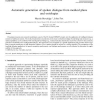Free Online Productivity Tools
i2Speak
i2Symbol
i2OCR
iTex2Img
iWeb2Print
iWeb2Shot
i2Type
iPdf2Split
iPdf2Merge
i2Bopomofo
i2Arabic
i2Style
i2Image
i2PDF
iLatex2Rtf
Sci2ools
JBI
2006
2006
Automatic generation of spoken dialogue from medical plans and ontologies
This paper presents some research undertaken as part of the EU-funded HOMEY project, into the application of intelligent dialogue systems to healthcare systems. The work presented here concentrates on the ways in which knowledge of underlying task structure (e.g., a medical guideline) can be combined with ontological knowledge (e.g., medical semantic dictionaries) to provide a basis for the automatic generation of flexible and re-configurable dialogue. This approach is next evaluated via a specific application that provides decision support to general practitioners to help determine whether or not a patient should be referred to a cancer specialist. The competence of the resulting dialogue application, its speech recognition performance, and dialogue performance are all evaluated to determine the applicability of this approach.
| Added | 13 Dec 2010 |
| Updated | 13 Dec 2010 |
| Type | Journal |
| Year | 2006 |
| Where | JBI |
| Authors | Martin Beveridge, John Fox |
Comments (0)

